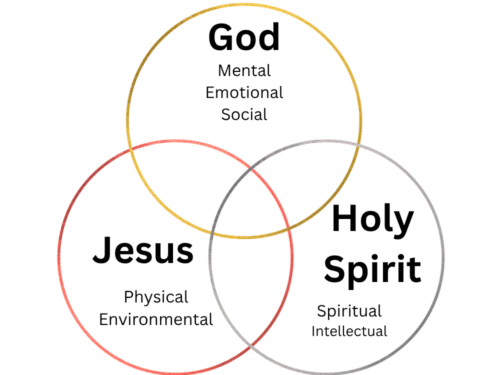In a world filled with wellness advice, self-help trends, and holistic health models, one thing becomes clear: true transformation comes when we align our health with God’s design. While secular frameworks offer helpful starting points, they often fall short of lasting change because they are rooted in self-effort instead of divine truth.
Let’s explore the 7 Pillars of Biblical Wellness—anchored in the belief that we are ‘Made in His Likeness’—and compare them to the more commonly known 8 Pillars of Holistic Health. You’ll see why the biblical model offers a more effective, Spirit-led path to whole-person healing.
The 7 Pillars of Biblical Wellness
This faith-centered model reflects the triune image of God: Mind (God the Father), Body (Jesus), and Spirit (Holy Spirit).
– Physical Health – honoring the body as God’s temple
– Mental Health – renewing the mind through God’s truth
– Emotional Health – stewarding the heart and emotional maturity
– Social Health – God-honoring community and relationships
– Spiritual Health – intimacy with the Lord, led by the Holy Spirit
– Environmental Health – stewardship of creation and sacred spaces
– Intellectual Health – seeking wisdom, truth, and lifelong learning

The 8 Pillars of Secular Holistic Health
– Physical – exercise, sleep, nutrition
– Emotional – emotional awareness and self-regulation
– Mental – mindset, cognitive function, stress management
– Social – relationships and social interaction
– Spiritual – sense of purpose, connection to something greater
– Environmental – external surroundings (home, nature, toxins)
– Occupational – career satisfaction, work/life balance
– Financial – budgeting, stability, money mindset
While the secular model emphasizes external balance and personal achievement, the biblical model prioritizes alignment with God’s will and stewardship of what He has given us. Here are some of the key differences:
Foundation
Secular Model: Self-improvement and balance
Biblical Model: Alignment with God’s design and stewardship
Spiritual View
Secular Model: Often ambiguous or inclusive of all paths
Biblical Model: Christ-centered connection through the Holy Spirit
Mental vs. Intellectual
Secular Model: Often combined or vague
Biblical Model: Clearly distinguished: Mental = Mind renewal, Intellectual = Learning and Wisdom
Environmental
Secular Model: Focused on safety and justice issues
Biblical Model: Rooted in peace, stewardship, and sacred space creation
Occupation/Finance
Secular Model: Separate pillars
Biblical Model: Integrated into other pillars like Social, Emotional, and Spiritual Health
Goal
Secular Model: Happiness, productivity, self-fulfillment (Self focused)
Biblical Model: Wholeness, holiness, and purpose in God (God-focused)
Why the 7 Pillars Are More Effective
True wellness isn’t just about balance—it’s about alignment. The 7 Pillars of Biblical Wellness are not self-help strategies; they are Spirit-led invitations to walk in the fullness of God’s design for our lives.
Unlike secular models that rely heavily on willpower and compartmentalization, biblical wellness integrates all aspects of life under the lordship of Christ. This results in not only healing, but restoration, purpose, and peace.








